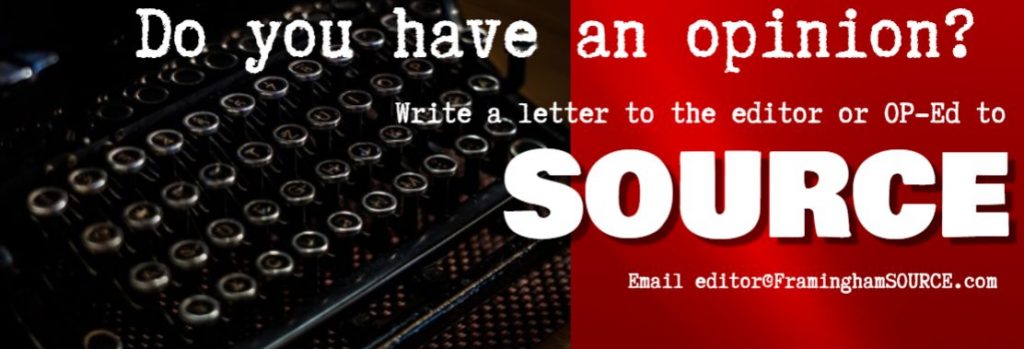[broadstreet zone=”53230″]
FRAMINGHAM – My name is Melina List, and I am a lifelong Framingham resident joining the outcry against statements made by Framingham Democratic Committee chair Mike Hugo advocating for the abortion of fetuses with congenital disabilities as to avoid the cost of educating disabled children within the Framingham Public School District.
Being pro-choice means affirming a person’s right to terminate a pregnancy and a person’s right to bring a disabled child into the world. These ideas are not contradictory. While issues of reproductive justice and disability justice may at times intersect in complicated ways, advancing access to reproductive healthcare—as the Framingham City Council recently and rightly did through their proclamation on the protection of reproductive rights—cannot be done at the expense of the disabled community and our futures. I argue that the Framingham Democratic Committee did not go far enough in their statement condemning Mr. Hugo’s remarks, and should, in both words and actions, further support Framingham’s disability community in the aftermath of this incident.
Mr. Hugo, I imagine that living with a worldview that values budget lines over fellow human beings must be devastatingly sad. I hope you gain some kindness from this experience.
[broadstreet zone=”54526″]
In the meantime, the people of Framingham, especially our city’s disabled community, deserve better leaders than someone who advocates eugenics and uses one form of justice to invalidate another. I join the many people calling for you to resign.
I am relieved to see public pushback to Mr. Hugo’s remarks, but must admit that some of it strikes me as performative.
I say this because my experience in the Framingham Public Schools, which I attended from kindergarten through my sophomore year of high school, reflected the incredibly harmful ideology expressed by Mr. Hugo, which while not always put so clearly (in order to avoid accusations of discrimination), are all-too-commonly held.
I say the following about my experience to connect it with the current conversation on how disabled people are undervalued, including in Framingham.
While I am not one of the people whom Mr. Hugo directly attacked in his statement by nature of my types of disabilities, I am disabled, which deeply impacted my experience in the Framingham Public Schools, particularly at Framingham High School.
At FHS, the way I was treated by administrators and support staff was nothing short of deplorable, and resulted in trauma I am still processing almost a decade later.
This time in my life is directly connected to the chronic illness I developed as a teenager and still live with today.
[broadstreet zone=”66385″]
My experience was impacted by a commonly-held mindset that saw me as difficult and costly by nature of being different from constructed norms, and valued productivity over the health of students.
The treatment I received during my brief year and change at FHS was disrespectful, unethical, at times questionably legal, and ultimately unconcerned with recognizing my humanity.
It is only because of attending a therapeutic school via private placement—a cost my family was able to pay that many less privileged are not, and that the district should have covered—that I graduated high school.
Attending a therapeutic high school, and escaping FHS, not only salvaged my education, but perhaps my life as well. I am now a student at Emerson College, where I currently have a 4.0 GPA, and am the Co-President of Advocacy at Access: Student Disability Union. In this role, I work to make education more accessible for members of my community, as I know the pain that common current educational standards cause first hand.
My accomplishments are directly in spite of how I was treated at Framingham High School.
[broadstreet zone=”53903″]
In all fairness to those who worked at Framingham High School then and work there now, I recognize that the people responsible for my well-being there were likely underpaid, under-resourced, and undereducated about neurodivergence. The issues I am describing are also not unique to Framingham, and are unfortunately widespread. This does not excuse those who caused me and countless other students harm, but it is a more accurate understanding of how societal beliefs influence individuals.
To everyone else who is rightly incensed by the idea that disabled people, especially disabled children, are worth less than the cost to educate them, I encourage you to interrogate the values often exemplified in our schools and society at large.
While statements like those expressed by Mr. Hugo are often rightly contested, the idea that disabled people are expensive, burdensome, and unworthy of participating in society are foundational to the way disabled people are currently treated in The United States, Framingham included. These ideas are even reflected in the commonly used term “special needs”—the needs of disabled people are not special, they are simply needs, and the term is unnecessarily othering and at times pathologizing.
[broadstreet zone=”59983″]
While Mr. Hugo decided to, as is sometimes put, say the quiet part loudly, the same ideology undergirds our public school system. We owe it to ourselves and each other to recognize and push back against rhetoric that values money over human life, whether this rhetoric is explicitly expressed or implicitly built into our systems.
I’d be eager to hear the voices of those who attended special education programs in the Framingham Public Schools and those with congenital disabilities amplified in this conversation, as the people directly targeted by Mr. Hugo’s disgusting remarks.
Disabled people are not disposable.
Disabled people are not an expense.
Disabled people are not a burden.
Nothing About Us Without Us,
Melina List
Framingham


